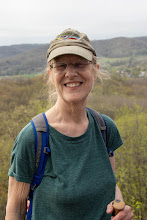Change is in the air with SLP. More people are getting outside the box and re-examining the worn-out paradigms of how we engage kids in the summer. This series of posts looks at aspects of SLP and ask us to think bigger, deeper and wider - and share experiences along the continuum for change.
Where are we going and how do we get where we want to be? That's a question I ask myself all the time - and most especially, in thinking about summer library programs. Two decades ago, I felt like we were on a treadmill of summer madness - how could we get off and change how we did the program to a model that was fun
and worthwhile for kids and staff?
The people I worked with joined me in asking questions and looking at the answers as well as the hopes we had. It has led to twenty years of reformatting and evolving the way we do SLP and that change has been
part of our planning in every job I've had ever since.
It starts with questions for which no one answer exists. Each library is unique in how the library and community come together. Here's a few questions and some suggestions on what you might do to guide your change process towards making SLP more meaningful at your library.
Begin (or continue)
to ask questions:
Are you reaching the age groups you want?
Running registrations for storytimes or events that
add to workload?
Constant programming or could you add more breaks?
Are programs generating increased use/circ by kids?
Is your registration or reading record process
cumbersome?
Is what you are doing fitting in with library goals
or school goals?
Are the kids focusing on reading or prizes?
How competitive do you want your program to be?
Think about what you are doing now and why you are doing it :
*
it satisfies kids
*you've always done it this way
*
it satisfies you
*
it satisfies parents
*
it works
*
it doesn’t work but staff or administration REALLY like it
Think about your
goals and the outcomes you want and how they can be accomplished.
For instance, if you want to:
1) Reach out to as many kids as possible?
In
person contact to spread the word on SLP is vital (School promo visits/spring
school visits or class visits)
Cooperate
with PTOs to spread word
Get info to schools (bookmarks) prior to parent
teacher conferences
Involve families (parents, preschoolers & readers
in program to spread the word)
Spread the word at other community spots where kids are: child care centers, Boys and Girls's Clubs etc
2) Give the kids a fun experience
Simplify paperwork so focus is on kids who come in,
not busywork
Take time for
events you and kids enjoy (booktalking; programs); cut down on other
unnecessary programs or requirements
Experiment with the theme and delivery – or
not - of prizes or rewards
3) Get the kids reading:
Do lots of reader’s advisory special displays
Let kids review books
Do lots of “seat-to-feet” service rather than hugging the desk
Create experiences that put kids and books together (books at programs for check-out; stealthy games)
4) Make the program low-stress for kids
De-emphasize or eliminate competitive aspects (most books read, etc)
Let kids read at own pace and in own interest areas
Consider library use and experiential activities within the library as an achievable outcome
Allow a break from school-year type demands
Let kids read at various levels and formats
Recognize the importance of being read to for
preschooler & poor readers
5) Make the program low-stress for staff
Keep record keeping simple
Think about whether
elements like oral reports; genre reading; prizes are necessary to the
successful
accomplishment of encouraging kids to read in the summer
Look for ways to
encourage cooperation with the community or schools to support kids & reading (mutual
booklists; beginning of school rewards; programs; Park
& Rec)
6) Be creative, inventive and have fun
Recognize that libraries are more than books
Embrace the many formats (inc. digital) and ways that kids come to literacy - it isn't just about reading
Picture yourself as a promoter and less as a record
keeper
Imagine yourself as marketing guru and your product
as reading
Give yourself permission to innovate
Finally,
learn when to say when!
It’s
important to recognize when elements of your program are no longer effective and to begin
planning to change
Evaluate your program:
Establish parent/child
focus group to talk about summer
Talk to school
colleagues for scuttlebutt on SLP
















.jpg)






